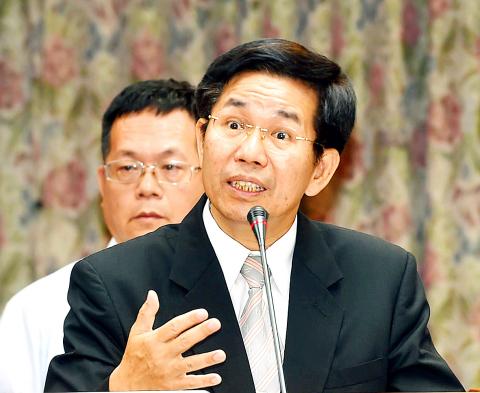Universities should move toward abolishing dormitory curfews by implementing diversified management rules, Minister of Education Pan Wen-chung (潘文忠) said yesterday.
Pan made the remarks during a question-and-answer session at a meeting of the legislature’s Culture and Education Committee, where several lawmakers asked questions about the controversy surrounding a student-led protest against a curfew that Fu Jen Catholic University imposed on female students living in dormitories.
The education minister initially refrained from giving a direct response when Democratic Progressive Party (DPP) Legislator Su Chiao-hui (蘇巧慧) asked his opinion on imposing curfews on female students, saying that universities have jurisdiction over the issue.

Photo: Fang Pin-chao, Taipei Times
DPP Legislator Rosalia Wu (吳思瑤) asked Pan to clarify his stance on the issue.
“Are such unreasonable access controls protecting female students, or are they putting them in greater danger?” Wu asked.
Pan said that the students are advocating total abolition of dormitory curfews, but that he thinks alternative management rules should be put in place before curfews are lifted.
When asked by DPP Legislator Hsu Chih-chieh (許智傑) how he would respond to students if he were the dean of Fu Jen, Pan said that he would probably issue identification cards to female students, granting them unlimited access to their dormitories via a card reader, provided that the time at which the students leave and return to their dormitories is recorded and forwarded to their parents.
Hsu showed a petition calling for the abolition of dormitory curfews at universities handed out by FJU Cinderella, a group formed by students opposed to the curfew, and asked Pan if he would sign it.
Pan said that he would if the language used in the petition were changed to: “I support abolishing dormitory curfews if accompanying measures are in place.”
In related news, Pan said that the ministry would form a new curriculum review committee comprising students, officials and experts within two months in accordance with a recently passed amendment to the Senior High School Education Act (高級中等教育法).
The new committee would be in charge of reviewing curriculum guidelines being drafted for a 12-year national education system, which are set to take effect in 2018.
Pan said that six draft proposals for the so-called “examination-enrollment corelative system” to be used in the 12-year national education system were discussed yesterday at a meeting of the Board of College Recruitment Commission, but that no conclusions had been reached.
The new testing system would come into effect in 2021, he said.

Nipah virus infection is to be officially listed as a category 5 notifiable infectious disease in Taiwan in March, while clinical treatment guidelines are being formulated, the Centers for Disease Control (CDC) said yesterday. With Nipah infections being reported in other countries and considering its relatively high fatality rate, the centers on Jan. 16 announced that it would be listed as a notifiable infectious disease to bolster the nation’s systematic early warning system and increase public awareness, the CDC said. Bangladesh reported four fatal cases last year in separate districts, with three linked to raw date palm sap consumption, CDC Epidemic Intelligence

Two Taiwanese prosecutors were questioned by Chinese security personnel at their hotel during a trip to China’s Henan Province this month, the Mainland Affairs Council (MAC) said yesterday. The officers had personal information on the prosecutors, including “when they were assigned to their posts, their work locations and job titles,” MAC Deputy Minister and spokesman Liang Wen-chieh (梁文傑) said. On top of asking about their agencies and positions, the officers also questioned the prosecutors about the Cross-Strait Joint Crime-Fighting and Judicial Mutual Assistance Agreement, a pact that serves as the framework for Taiwan-China cooperation on combating crime and providing judicial assistance, Liang

Reports of Taiwanese going missing, being detained or interrogated, or having their personal liberties restricted in China increased about fourfold annually last year, the Mainland Affairs Council (MAC) said yesterday. Last year, 221 Taiwanese who traveled to China were reported missing, were detained and interrogated, or otherwise had their personal freedom restricted, up from 55 the previous year, the council said. Reopening group tours to China would be risky, as it would leave travelers with no way to seek help through official channels after Beijing shut down dialogue between the associations tasked with handling cross-strait tourism, the MAC said. Taipei’s Taiwan Strait Tourism

SHIFT: Taiwan is evolving from a transit stop into a tourist destination, with more international travelers willing to spend on tours, dining and cultural activities Taiwan rose three places in the World Tourism Barometer to 36th globally in 2024, with international tourism revenue of US$10.028 billion, the Tourism Administration said on Monday. The UN Tourism Organization publication said that its focus has switched from whether a country has returned to pre-COVID-19 levels of tourism to the amount spent by a tourist during an overseas trip. The nation last year welcomed 8.57 million international tourists, about 9 percent more than in 2024, with most tourists coming from Japan, South Korea, and Hong Kong and Macau, all of which accounted for at least 1 million tourists each. During the first